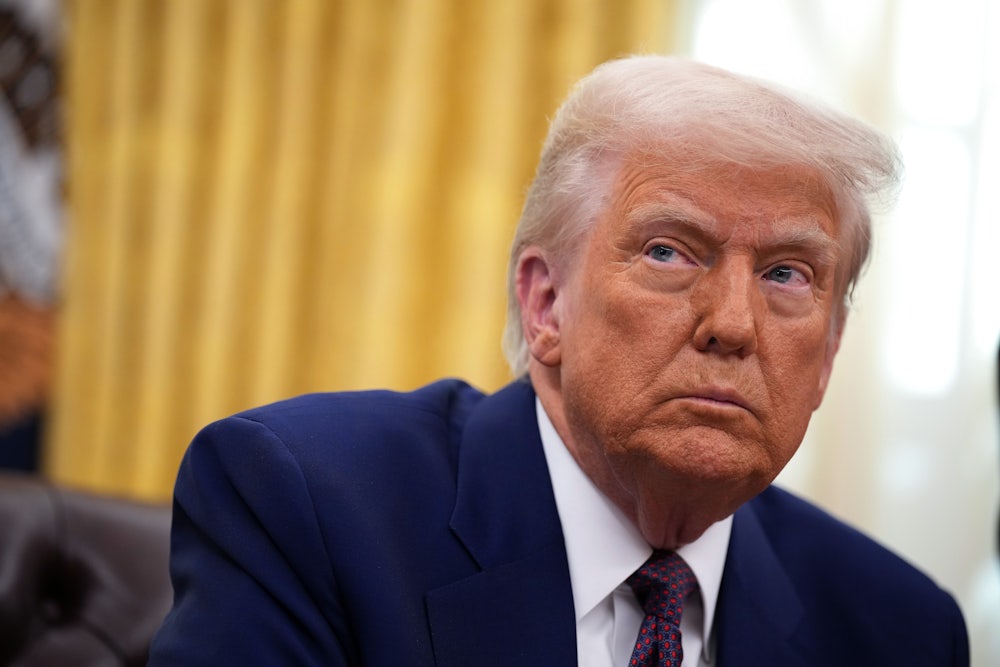As you watch President Donald Trump and Elon Musk recklessly attempt to destroy the federal government like a pair of toddlers picking legs off a spider, it seems as if Republicans have decided public opinion no longer constrains them in the least. Polls are already demonstrating public dissatisfaction with Trump-Musk’s autocratic overreach and top agenda items, yet they have only intensified their assault, and GOP lawmakers who have dared to air their concerns have done so in only the meekest of terms.
That’s why a new memo from the top pollster on Trump’s 2024 campaign is so intriguing: It finds that sizable majorities in competitive House districts are still unhappy about their economic predicament. Read carefully, it also gently warns Republicans that some Trump priorities they’re about to enact could prove unpopular in those districts, though it avoids saying this directly, perhaps to avoid angering the Audience of One.
The memo suggests that some Republicans, at least, do think public opinion matters, and even that maybe—just maybe—they do fear being held accountable in future elections. Like, for instance, next year’s midterms.
The memo’s key findings are that 59 percent of voters in 18 swing districts are “worried about their personal financial situation” and that Democrats are leading in the House generic ballot matchup by five points. As the memo delicately notes, “Republicans have to play catch up.” Trump’s approval in these districts is 47–49, two points underwater.
All that adds up to bad news, especially coming from pollster Tony Fabrizio, a chief architect of Trump’s 2024 victory. Indeed, according to Politico, which first reported on the memo, vulnerable Republicans are taking it very seriously.
What’s more, in these swing districts, a whopping 80 percent favor extending the Affordable Care Act subsidies for health insurance that Democrats expanded in 2021, which will expire this year. The memo tells Republicans that extending those subsidies would demonstrate that they support the working class, who are overwhelmingly aided by these subsidies.
Meanwhile, the poll shows that majorities oppose cutting taxes on corporations. It finds that 63 percent say their top priority for tax policy is helping “working-class families,” versus 1 percent—no, really, 1 percent—who say it’s helping corporations and the wealthiest Americans.
In short, what Fabrizio’s memo really says is this: Swing voters still feel financially precarious, even though Trump keeps commanding them to think they’re scoring “WINS!” under his glorious leadership. And fiscal policy that takes money from lower-income and working people to help finance lower taxes for corporations and the wealthy will be unpopular in these swing House districts. The memo essentially warns Republicans to stand for prioritizing lower-income and working Americans, not corporations.
Guess which one of these sets of priorities Republicans are going to champion?
We already know the answer, and this, I think, is the real reason this memo matters. Next week, House Republicans will hold a major vote on Trump’s fiscal agenda. The House blueprint, which Trump backs, lays the groundwork for up to $880 billion in Medicaid cuts and tens of billions in cuts to food stamps.
Supporting those things will not be politically easy for some Republicans. Vulnerable House Republicans recently signed a letter urging a rethinking of deep cuts to Medicaid and food stamps, explicitly declaring that this could cost the GOP among some swing constituencies that boosted it in 2024, including working people.
But the math is unforgiving. It’s hard to see how Republicans pay for their enormous tax cuts for the rich and corporations without deep cuts to those programs. If and when the party goes ahead with them, most or all of these vulnerable Republicans will go along. They will get no points for foot-stamping letters demanding the contrary.
One caveat: The Fabrizio poll finds that a very slim majority supports extending Trump’s 2017 tax cuts when they are not defined. But that package contained enormous tax cuts for the rich and corporations, and those would get extended too. Given the poll’s clear finding that cutting corporate taxes is unpopular—and that working people should be prioritized over the rich—if Democrats can effectively argue that extending Trump’s tax cuts would constitute a huge continued giveaway to the wealthy, Democrats can turn popular opinion against them.
There’s precedent for this. During Trump’s first presidency, Republicans confidently believed that they could hoodwink voters into seeing Trump’s original tax cuts as a winner for working Americans. But then the battle was joined, and Republicans were so on the defensive that they stopped talking about the issue at all. That tax bill’s passage was a key reason that Democrats won dozens of seats in the 2018 elections.
By the way, don’t overlook the poll’s finding about the popularity of extending the expanded ACA subsidies. This too puts Republicans in a difficult spot. The nonprofit group KFF calculates that Republicans represent more than half of ACA enrollees likely to see large premium jumps if the subsidies expire. “House GOP constituents would see the biggest shock from these tax credits expiring,” Larry Levitt, an executive vice president at Kaiser, told me.
What will Republicans do? A lot of those constituents are working and middle class, as HuffPost’s Jonathan Cohn details, but extending these subsidies will collide with the bedrock GOP ideological commitment to policies that take from poor and working people to keep taxes low on rich people and corporations.
That’s the big picture on all these fronts: Trump and Republicans will again want to advance those broad priorities, but they’ve also been shown repeatedly to be a big political loser. We now have this straight from Trump’s own pollster, who is effectively warning them off of doing exactly that. But as should be overwhelmingly clear by now, they are very much poised not to listen.






